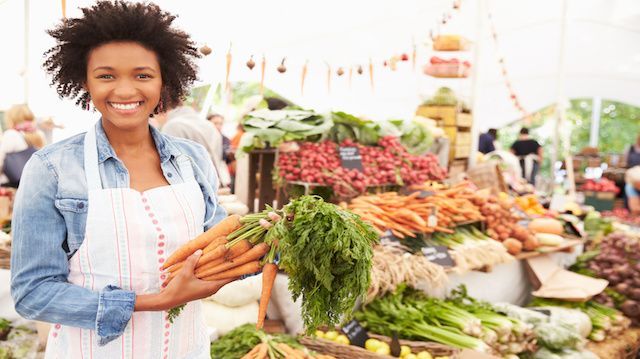
If you say no to pesticides, 89 percent of Americans queried agree with you, a Consumer Reports survey shows. After polling 1,005 people, the report found that the topic of pesticides in food is important to most of us. We put together two lists: one of fruits and veggies that you should always eat organic, and the other with produce safe to buy and eat non-organic (or conventional).
When you buy organic, in general you will be exposed to a smaller amount of pesticides, which tend to be more naturally derived. These more natural pesticides break down easier in the environment (and we suspect in our bodies also). Therefore, buying organic is healthier for the environment, farm workers, wildlife, bees and all of us.
Charlotte Vallaeys, senior policy analyst at Consumer Reports, gives us a clearer understanding. “Eating fruits and vegetables is one of the most important things people can do for their health, and we always recommend certified organic produce as the best choice,” she says. “That’s because the use of pesticides in conventional agriculture can affect not only the people who eat the treated crops, but also farm workers, people living near farms, wildlife and pollinators.”
To further show the importance of eating organic, the results from a Swiss study on a family with young and older kids that went from eating non-organic conventional foods to eating organic foods for two weeks is amazing (see video link).
IVL Swiss Environmental Research Institute facilitated the study, titled Human Exposure to Pesticides from Food, and measured the concentration of pesticides in each family member’s urine sample. They found that after eating organic food for only two weeks, there was a significant drop in pesticide residue in the urine samples. Imagine if you always ate organic. We agree with the mom, who doesn’t like the pesticides in her kids’ bodies.
Because of varying factors — such as where the produce is from, the measurements used and the country of origin — the organic/non-organic recommendations may differ. We compiled these general guides after consulting a Consumer Reports scientific study. But a good rule of thumb: When in doubt, go organic.
Always eat organic
Fruits:
- Apples
- Cranberries
- Nectarines
- Peaches
- Plums
- Strawberries
- Tangerines
Veggies:
- Cucumbers
- Celery
- Green beans
- Hot peppers
- Sweet bell peppers
Okay to eat non-organic
Fruits:
- Bananas
- Oranges
- Pineapples
- Watermelons
Veggies:
- Avocados
- Cabbage
- Mushrooms
- Onions
Also, consider the seasonality factor when buying produce — it’s always best to buy during the natural growing season instead of the off-season.
Here are a few suggestions in case you get to the grocery store and forgot your list. First, buy organic if possible. Second, if the fruit or vegetable has a peel that you don’t plan to eat, like a pineapple, buying conventional is okay. To a degree, a peel protects the insides from pesticides — like a layer of armor. Third, when there’s no natural covering, buy organic. Lastly, it’s healthier to eat conventional fruits and vegetables rather than not eating any fruits and vegetables at all.
Now that you’ve got the proper fruit or vegetable, what’s next?
Do you need to clean fruit and veggies?
Absolutely. Wash all produce before eating, even if it’s organic.
What’s the best way to wash fruits and veggies?
Rinse them under running water, according to both the Environmental Protection Agency (EPA) and scientists. Not only is washing fruits and veggies better under running water, mostly due to the abrasive effect, it also removes more bacteria and leftover pesticides than soaking does. If you want to take it one step further, you can use a vegetable scrubbing brush.
Next, blot the water with a clean towel or an earth-friendly paper towel to remove even more bacteria and pesticides.
This process may (or may not) be more than you’re doing, but once you incorporate these simple ideas into your produce prep, it will become a habit.
What about using fruit/vegetable wash?
Water works just as well (and saves you money).
Research from the University of Maine found that distilled water is equal or better than three different commercial fruit and vegetable washes. Other research supports this. But it makes sense to use a wash, right? You wash your hands with soap to get germs off, why not wash fruits and veggies with produce wash, too? Well, some studies show that just washing produce under cold running water is the same as or better than produce washes. You can keep using that vegetable wash, but it’s just an extra step.
After the produce is clean, is it better to peel before eating?
Yes, we recommend peeling when possible. But here are a few peels you can eat. And if you’re going to eat the peel, buy organic — it reduces the risk of pesticides.
So check out our quick lists, look for the fruits and veggies you buy, and then follow our guidelines. Always do a proper prep: Wash under clean running water and blot dry. Peel when possible, and eat the peels (if suitable) when you buy organic. Follow these few simple steps and you’ll feel healthier, too!
—Nikki Walsh
Nikki Walsh is a freelance writer and mom of two kids living in Southern California. She holds an MBA in marketing from University of California, Irvine and a bachelor’s degree in Biochemistry from UCSD. She has been practicing Kelee meditation for 19 years. When she is not writing she can be found out and about having fun with her kids.
Sources:
http://www.consumerreports.org/content/dam/cro/news_articles/health/CR_FSASC_FromCroptoTablePesticides_Mar2015.pdf
http://www.consumerreports.org/content/dam/cro/magazine-articles/2016/March/Consumer_Reports_Natural_Food_Labels_Survey_2015.pdf
https://www.epa.gov/safepestcontrol/pesticides-and-food-healthy-sensible-food-practices
https://www.coop.se/vart–ansvar/ekoeffekten/the-organic-effect
https://extension.umaine.edu/publications/4336e

